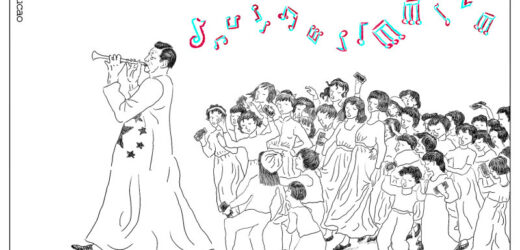Credit:Illustration: Badiucao
To submit a letter to The Age, email [email protected]. Please include your home address and telephone number. No attachments, please include your letter in the body of the email. See here for our rules and tips on getting your letter published.
SCHOOLS
A safe place where kids learn about boundaries
Gary Warren (Talking Point, 25/3) provides a balanced and sane analysis of behavioural problems in schools. He singles out boys, in particular, as providing a delightfully elevated set of challenges – and I would agree. I started teaching many decades ago, and “retired’ last year, only to return again as a casual teacher. Recently, I had a young graduate come to me, shaking, after she had survived a couple of hours with a feral grade 5-6 class. She asked, “You’re experienced – what do I need to do differently?” I had to tell her that I had already refused to teach that grade any more.
Most behavioural issues arise from situations that schools cannot control, such as terrible home situations, undiagnosed or poorly supported learning difficulties and personality disorders. Restorative “justice” works for a lot of kids, but there also has to be a consistently applied, non-negotiable system of sanctions for unacceptable behaviour. We are doing no favours at all for these students by exempting them from expectations of civilised behaviour. Boundaries are a necessity.
Additionally, the concentration on NAPLAN tests (The Age, 25/3) ensures that classrooms, particularly from grade 3 onwards, are often uninspiring pressure cookers, resulting in many kids giving up or acting out. I do not have the answer to fixing any of this: after all, I am old-school and therefore irrelevant. And yet, as teachers, we know we can’t mend what is outside the school gates, but we can try to provide a safe place where everyone understands and then learns from the consequences, good and bad, of their actions.
Jane Neville, Wattle Flat
Writing deserves a central place in the curriculum
The damaging effect of NAPLAN on the teaching of writing is most apparent. Its tentacles have spread to constrict the view of the writing landscape, reducing the teaching of the testing genres to the level of recipe writing. However, NAPLAN does not account for all the issues surrounding the teaching of writing, particularly in secondary schools. Part of the problem is that writing is not afforded equal rights with reading, and the interdependence of these foundational members of the literacy family is not appreciated.
Writing is frequently presented in ways that strip developing writers of voice, choice and a clear sense of agency. The focus tends to be on what to write, rather than how to write. At a time when adolescents are seeking greater independence, they are increasingly directed to write in predetermined ways. Such approaches disenfranchise young writers, leading to disengagement. Writing is frequently squeezed for time in the secondary curriculum. This leads to an oversupply of “read and respond” activities.
Writing promotes thinking and memory, acts as a means to problem solving and is a communication tool that allows others to grasp meaning. While it is reduced to a support role, students are being deprived of a powerful way to meaningfully organise thought. While NAPLAN is complicit, we need to delve deeper to reveal the wider malaise in the teaching of writing.
Alan Wright, Mornington
Please don’t tell me schools can’t get teachers
While the education system bewails its teacher shortage, perhaps those involved would do well to look in a mirror. In October 2020, Daniel Andrews announced the imminent employment of some thousands of tutors in schools to address the problems caused by COVID-19 lockdowns. As someone who had been an English teacher for 25 years, I immediately applied. I am still waiting for a response.
In the subsequent years, principals and/or staffing officers at local schools – including one where I taught for 20years – have seemed either politely uninterested or too busy to bother. I am occasionally referred to the education website to lodge my application, but it is clear that schools do not utilise this resource. The education minister and my local MP cannot help. The union is not interested.
Perhaps someone could clarify whether this is a case of ageism or a demonstration of an overburdened system otherwise in crisis. Either way, please stop telling me that schools cannot get teachers. They are not even trying.
Geoff Allshorn, Montmorency
THE FORUM
A cruel lack of sympathy
“Molly’s carers take aim at critics” (The Age, 25/3). How low can some people crawl if an incident where a disabled person with an acquired brain injury urinates in his seat is described as “disgusting” and “a disgrace”, and that is followed by “outrage” (really?) and “ridicule” (sadly)? It is more an indictment of these commentators than of anything that Ian “Molly” Meldrum has done.
Sam Bando, Malvern
Molly’s right to go out
What sort of society have we become that we are unable to cope with, or accept, that an elderly man who has survived a significant brain trauma is able to be out in public with his significant disabilities? We should be able to recognise this as a triumph of Molly’s spirit, not a disgrace as his critics are so quick to point out. Caring for people living with a brain injury is challenging.
The challenge is how to maintain dignity, inclusion and enjoyment in life with the least amount of restrictions. Would Molly’s critics prefer he be locked away so we don’t have to see?
Marian Allison, Northcote
Loving family and friends
Thank goodness Molly Meldrum’s friends are providing support for him to remain at home. It takes a village to support an older person with cognitive failure to live at home. Although many older people receive government assistance to remain there, unpaid carers – family, friends, neighbours – often undertake most of the work of caring for them.
Sarah Russell, Mount Martha
Time for us to speak out
The misery of the climate debate is described in the excellent article by Penny Sackett, a former chief scientist for Australia, and Chris Barrie, a former chief of the Australian Defence Force (Comment, 25/3). Their central tenet is that the “debate” has been subjugated into climate wars by those who see it as an opportunity for political or commercial advantage. They ask for Australian voices to be raised in a thundering crescendo. Here is my voice, I am thundering as loudly as I can.
Peter Moore, Clifton Hill
Action needed on scams
All credit to Jon Faine in exposing the scale and implications of the criminal scam epidemic costing Australians as much as $4billion per year (Sunday Age, 26/3). Like COVID-19, its viral equivalent, it calls for urgent governmental, corporate and community protection which is not yet in place. “It couldn’t happen to me” is a delusion. We are not necessarily our rational selves when subjected to ever more sophisticated, unfamiliar interventions: the Stockholm syndrome applies. Criminals purporting to represent major companies will help you solve your purported problem.
Faine spells out three solutions: better detection by banks, a public education campaign and a nationally co-ordinated intergovernmental campaign. Let’s just do it.
Angela Munro, Carlton North
A fair go for the Voice
The opposition leader is being disingenuous when he asks for the government to release the solicitor-general’s advice on the wording of the constitutional amendments for the Voice. Whatever the advice, Peter Dutton will find another obstacle. He is stalling and must “show his hand” either way. Your editorial (The Age, 25/3) is correct: “The Voice deserves to be given clean air and a fair go”.
Kate McCaig, Surrey Hills
Let’s legislate it first
I agree that it is time to give the Voice “a fair go” because it has a fair chance of reducing Indigenous disadvantage. We do not yet know for certain that it will be effective, but if it proved to be ineffective, we would not want future governments to have to commit to it because it is in the Constitution.
Would it not be better and cheaper to legislate for a Voice and then, if it is effective, hold a referendum to put it in the Constitution? Knowing that the Voice is effective would increase the chance of success at a referendum. Also, this path would reduce the prospect of making Australia seem racist if the referendum fails.
Harley Powell, Elsternwick
Why the AFL has lost me
What could be better on a Saturday arvo, with the sun shining, than a Collingwood versus Port Adelaide game at the MCG? Sadly the experience is so different now. Loud music and commentary at intervals make conversation almost impossible. Moving ads provide a continual distraction during play. The tower lights turned on at half-time with not a cloud in the sky. Why? I left before three-quarter time with my team winning by eight goals. Goodbye, Collingwood. Goodbye, AFL. You have lost me after some 70 years of attending games.
Ron Reynolds, Templestowe
Try a Magpies’ win by 71
Ahem. Who are the two Age football tipsters that picked Port Adelaide to defeat Collingwood by four and five points respectively (Sport, 24/3)? Oh dear.
Nick Jensen, Canterbury
Young buyers missing out
On Saturday I went to an auction of a lovely, old Californian bungalow house. The paintings, books, photos, knick-knacks all so loved. The “well-worn” sofa (with the soft toys resting on its back) and chairs, all speaking of a home, not just a house. Lots of its original features were intact.
One bidder, a middle-aged man, stood nonchalantly with his back to the house. The other bidder, a young couple looked lovingly at it, perhaps already thinking of it as their future home. The man opened with a high offer but no sooner had the couple bid, he went quickly again with a much higher offer and so it continued. (I wanted desperately for the young couple to win.) But it was not to be. I slowly walked home with a heavy heart. Just another Melbourne auction.
Maureen Caldow, Brunswick West
Our pretty good system
We need to look at how election campaigns are run in the United States and the behaviour of Donald Trump, then compare this with how Chris Minns and Dominic Perrottet ran their campaigns in the New South Wales election. I feel so much better living in Australia than I would in the US.
Lou Ferrari, Richmond
Preserve public service
Oh, the irony. Spending on consultancies has tripled since the Andrews government was elected (The Age, 23/3) and now we learn about possible cuts to the public service (The Age 25/3). If we continue with outsourcing, a hollowed-out public service will not enable the fearless and frank advice that governments require.
A development strategy that rebuilds the skills and competencies within various departments and reduces or eliminates external advice, usually sourced at a much higher cost, is required. We only need to consider the robo-debt royal commission and the National Disability Insurance Scheme review to see the outcomes of a reduced public service capacity, the impact of poor advice and the effect on people’s lives.
Denise Stevens, Healesville
A twisted illogical logic
One day you read that, because the public service has been run down, the Victorian government is paying billions to private consultancies. And then a day or so later you read that it is planning to cut public service jobs in order to save costs. Go figure (if you can).
Elizabeth Pearce, Hawthorn
Please explain, premier
Re the increased use of consultancies by the Victorian government. Am I stupid? I thought the public service was in place to advise the government of the day. When did this change? Why pay twice for advice? Were public servants not doing their jobs?
Jennifer Carty, Toorak
Be honest with people …
Labor keeps producing different reasons as to why we need AUKUS. The latest is the defence minister’s zinger that the submarines will one day protect our shipping lanes – the same lanes that in many cases China has a vested interest in keeping open, as others have noted.
In the absence of a clear and convincing justification for why it wants to make this massive shift towards forward defence, the government is looking like the Kerrigan family in the film, The Castle, as they grasped for reasons why the court should spare their house from demolition.
One of Labor’s reasons for AUKUS is that we are living in “changed conditions”, which is about as convincing as the Kerrigans’ winning argument, “it’s the vibe”. The Kerrigan approach may work in fantasy land, but it doesn’t work in the serious court of public opinion. It is time for Labor to do the right thing and discuss its valid defence concerns with the Australian people.
John Wallace, Breamlea
… and do the right thing
Re today’s expulsion vote for Moira Deeming. Victoria’s Liberal Party must decide whether freedom of speech means there are no boundaries on what can be said and done by its members and MPs. An unsuccessful outcome may result in an unelectable opposition. This would be unacceptable for democracy.
The Liberals must understand that Victorians have boundaries as to what is acceptable from those who wish to govern. Organisations that do not have boundaries suffer brand damage and inevitably collapse. I urge Liberal MPs to really consider the consequences of their actions. Victoria needs them to do the right thing.
Nick Avery, East Geelong
A few welcome ’wins’
As an old leftie Western Bulldogs supporter, thank goodness for the state and federal elections to ease the pain.
Ken Foxcroft, Curlewis
Voting yes for the Voice
A sentence from this letter, published on Saturday, was omitted during editing: I was 12 when the 1967 referendum regarding recognition of Aboriginal people was overwhelmingly supported. It surprised this 12-year-old that it had taken so long for it to happen, and the result was so uplifting. Let us hope that the spirit of 1967 is still with us in 2023.
Greg Norton, Box Hill
AND ANOTHER THING
Politics
All states and territories, apart from Tasmania, are now Labor. Liberal MPs in Tasmania will be getting nervous.
Steve Barrett, Glenbrook
I knew Labor would win NSW when the Liberals again engaged John Howard. When will they learn he’s an anachronism?
Neil Hudson, East Melbourne
If the Andrews government didn’t spend so much on consultancies, there’d be no need to consider sacking public servants.
Katriona Fahey, Alphington
Another question Peter Dutton can ask in his quest for more detail: What colour will the carpet be in the Voice’s office?
Alistair Davies, Thornbury
Your correspondent hits the nail on the head when he says “democracies only have one class of citizen” (24/3). That’s why we must vote Yes.
Judi Herkes, Kensington
I thought Johnny Farnham was ″the Voice″.
Guy Obeid, Albert Park
AFL
None of The Age’s experts tipped the Saints to beat Freo or the Dogs. Please keep it up, it’s working.
Joanne Hayes, Warrandyte
It seems the Demons were inspired by the “light bulb moment” at the Gabba on Friday and then kicked six straight goals.
Roger Farrer, Hampton
Could whoever takes over from Gil McLachlan please standardise the timing of night matches as it’s all over the clock face.
Wayne Smith, Myrtleford
Furthermore
I’m delighted that cartoonist Matt Golding won a Quill Award (25/3). His sense of the absurd and lateral thought have me in stitches or in awe for his sharp wit.
Martin Hengeveld, Research
Re teaching trainee teachers how to teach in their teaching course (23/3). What a radical idea.
Margaret Ryan, Kingsbury
Is “digital writing” two-finger typing?
Adrian Tabor, Point Lonsdale
Patrick Elligett sends an exclusive newsletter to subscribers each week. Sign up to receive his Note from the Editor.
Most Viewed in National
From our partners
Source: Read Full Article



